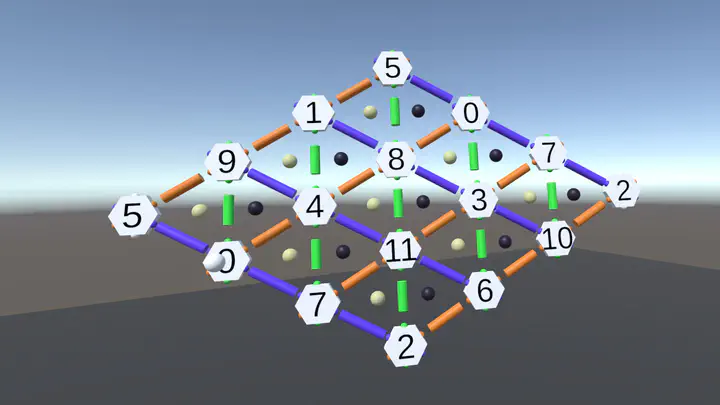Virtual Tonal Spaces (VTS)
Towards an interactive digital environment for music theory

Laufzeit
10/2023 bis 06/2024
Project
Mathematical, formal descriptions of tonal relations are usually modeled as tonal spaces in which the distances and relative positions represent functional and musical meanings. In these abstract spaces, fundamental musical concepts, such as scales or chords, are found as complex objects, allowing us to make rational and formally precise statements about musical structures. In visualizations of tonal spaces, continuous design and graphic parameters, such as color, intensity, light direction, etc., can be associated with so-called musical secondary parameters such as timbre or loudness, thus incorporating not only structural but also aesthetic dimensions.
This kind of access to music is often difficult to convey. The high dimensionality of music means that even digital offerings on the screen do not convey tonal spaces with sufficient clarity. Here, the extended field of view and the higher degrees of freedom of virtual reality environments offer the possibility to express musical parameters more clearly through aesthetic parameters and thus to generate a better understanding among learners.
The project aims to simplify the teaching of tonal spaces through such an interactive environment. On the one hand, learners should be able to proceed playfully and exploratively, and on the other hand, they should be able to grasp and experience concrete (historical or systematic) models of tonal spaces in the truest sense of the word. Interdisciplinary basics of music theory (mathematics, music history, acoustics) thus become particularly vivid.
The learning effect with regard to the understanding of tonal relationships is determined in the process on the basis of quantitative as well as qualitative empirical data and serves the ongoing development.
Didactic perspective
The basic pedagogical approach is playful-explorative and thus complements formal and theoretical descriptions in teaching and specialized literature. The learning environment VTS should be usable without prerequisites and invite subsequent joint reflection, for example in a seminar context.
The playful approach is intended to motivate deeper engagement, for example in the context of bachelor’s or master’s theses, in which students can add further modules to VTS or further explore its didactic potential. For example, it is planned that VTS can be used by up to two players simultaneously, which would promote the collaborative construction of music and thus co-creativity. Didactically, this represents an action-oriented teaching approach that allows students to jointly learn about musical structures in three-dimensional space either in a task-oriented manner (prepared by the teacher) or freely (exploratory and creative). Students would get immediate experience with the visualization of musical structures, their sonification and a gamification approach within the framework of a single application, which at the same time increases their media competence. This is can motivate student teachers in particular to reflect on the use of interactive media in their later professional life.
Initially, students of music-related subjects (musicology, music pedagogy, ethnomusicology, music theory) at various Würzburg institutions (University, University of Music, University of Applied Sciences) as well as those interested in music from other subjects such as computer science, mathematics and digital humanities are addressed. This lends itself to the highly interdisciplinary nature of the project. At the same time, in terms of sustainability, this project will provide a basis for applications to be developed beyond this at a later stage, which could, for example, realize interactive improvisations and compositions by learners within these spaces.
Collaborators
Almut Gatz (Hochschule für Musik Würzburg)
Project support
Dr. Annika Kreikenbohm (WueDIVE)